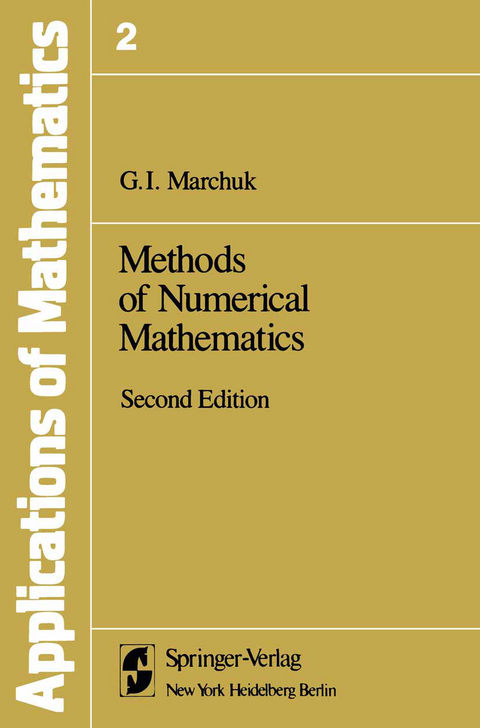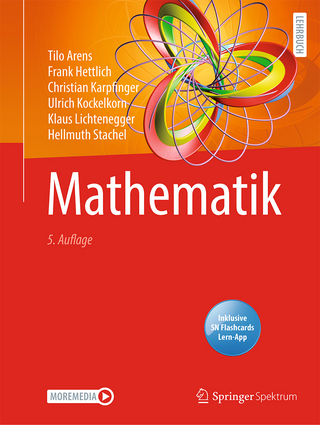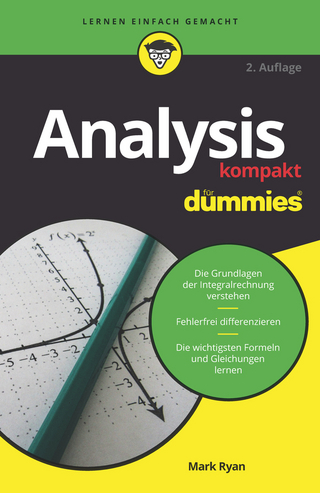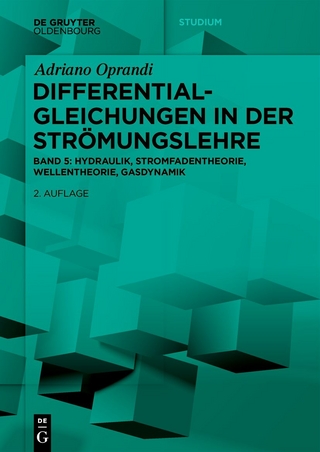
Methods of Numerical Mathematics
Springer-Verlag New York Inc.
978-1-4613-8152-5 (ISBN)
1 Fundamentals of the Theory of Difference Schemes.- 1.1. Basic Equations and Their Adjoints.- 1.2. Approximation.- 1.3. Countable Stability.- 1.4. The Convergence Theorem.- 2 Methods of Constructing Difference Schemes for Differential Equations.- 2.1. Variational Methods in Mathematical Physics.- 2.2. The Method of Integral Identities.- 2.3. Difference Schemes for Equations with Discontinuous Coefficients Based on Variational Principles.- 2.4. Principles for the Construction of Subspaces for the Solution of One-Dimensional Problems by Variational Methods.- 2.5. Variational-Difference Schemes for Two-Dimensional Equations of Elliptic Type.- 2.6. Variational Methods for Multi-Dimensional Problems.- 2.7. The Method of Fictive Domains.- 3 Interpolation of Net Functions.- 3.1. Interpolation of Functions of One Variable.- 3.2. Interpolation of Functions of Two or More Variables.- 3.3. An r-Smooth Approximation to a Function of Several Variables.- 3.4. Elements of the General Theory of Splines.- 4 Methods for Solving Stationary Problems of Mathematical Physics.- 4.1. General Concepts of Iteration Theory.- 4.2. Some Iterative Methods and Their Optimization.- 4.3. Nonstationary Iteration Methods.- 4.4. The Splitting-Up Method.- 4.5. Iteration Methods for Systems with Singular Matrices.- 4.6. Iterative Methods for Inaccurate Input Data.- 4.7. Direct Methods for Solving Finite-Difference Systems.- 5 Methods for Solving Nonstationary Problems.- 5.1. Second-Order Approximation Difference Schemes with Time-Varying Operators.- 5.2. Nonhomogeneous Equations of the Evolution Type.- 5.3. Splitting-Up Methods for Nonstationary Problems.- 5.4. Multi-Component Splitting.- 5.5. General Approach to Component-by-Component Splitting.- 5.6. Methods of Solving Equations of the Hyperbolic Type.-6 Richardson’s Method for Increasing the Accuracy of Approximate Solutions.- 6.1 Ordinary First-Order Differential Equations.- 6.2. General Results.- 6.3. Simple Integral Equations.- 6.4. The One-Dimensional Diffusion Equation.- 6.5. Nonstationary Problems.- 6.6. Richardson’s Extrapolation for Multi-Dimensional Problems.- 7 Numerical Methods for Some Inverse Problems.- 7.1. Fundamental Definitions and Examples.- 7.2. Solution of the Inverse Evolution Problem with a Constant Operator.- 7.3. Inverse Evolution Problems with Time-Varying Operators.- 7.4. Methods of Perturbation Theory for Inverse Problems.- 7.5. Perturbation Theory for Complex Nonlinear Models.- 8 Methods of Optimization.- 8.1. Convex Programming.- 8.2. Linear Programming.- 8.3. Quadratic Programming.- 8.4. Numerical Methods in Convex Programming Problems.- 8.5. Dynamic Programming.- 8.6. Pontrjagin’s Maximum Principle.- 8.7. Extremal Problems with Constraints and Variational Inequalities.- 9 Some Problems of Mathematical Physics.- 9.1. The Poisson Equation.- 9.2. The Heat Equation.- 9.3. The Wave Equation.- 9.4. The Equation of Motion.- 9.5. The Neutron Transport Equation.- 10 A Review of the Methods of Numerical Mathematics.- 10.1. The Theory of Approximation, Stability, and Convergence of Difference Schemes.- 10.2. Numerical Methods for Problems of Mathematical Physics.- 10.3. Conditionally Well-Posed Problems.- 10.4. Numerical Methods in Linear Algebra.- 10.5. Optimization Problems in Numerical Methods.- 10.6. Optimization Methods.- 10.7. Some Trends in Numerical Mathematics.- References.- Index of Notation.
| Erscheint lt. Verlag | 8.11.2011 |
|---|---|
| Reihe/Serie | Stochastic Modelling and Applied Probability ; 2 |
| Übersetzer | A.A. Brown |
| Zusatzinfo | 3 Illustrations, black and white; XIV, 510 p. 3 illus. |
| Verlagsort | New York, NY |
| Sprache | englisch |
| Maße | 155 x 235 mm |
| Themenwelt | Mathematik / Informatik ► Mathematik ► Analysis |
| Mathematik / Informatik ► Mathematik ► Wahrscheinlichkeit / Kombinatorik | |
| Schlagworte | Numerische Mathematik |
| ISBN-10 | 1-4613-8152-5 / 1461381525 |
| ISBN-13 | 978-1-4613-8152-5 / 9781461381525 |
| Zustand | Neuware |
| Haben Sie eine Frage zum Produkt? |
aus dem Bereich


